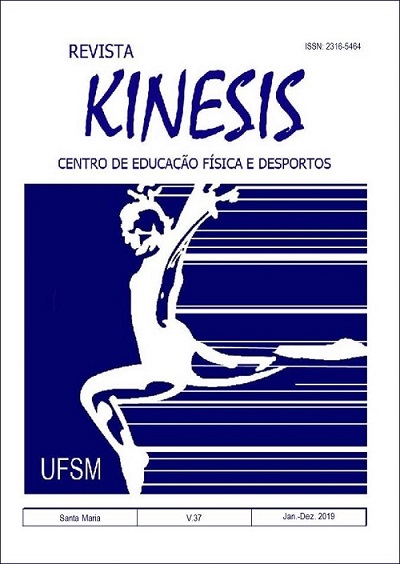Bullying as a systematic violence that leads to stigmatization in soccer schools
DOI:
https://doi.org/10.5902/2316546430606Keywords:
Sport, Teaching, Educational InclusionAbstract
Thousands of children walk the soccer path as a sports practice in Brazil. Bullying is a phenomenon present in the family, school and sports environment, including in soccer sports schools, and that generates many harmful consequences. The methodology used in this study was bibliographic research, based on digital journals. The main targets of bullying in the soccer schools are the students with motor difficulties, obesity or with some deficiency and also the girls. It is concluded that football, teacher, parents and other people that participate in the training process should be attentive to avoid the occurrence of the bullying phenomenon, seeking through education and sports to contribute to the development of values such as respect, confidence, self-cooperation, valuing the group work, the healthy practice and the friendship.
Downloads
References
BICKEL, Éderson Alexandro. Esporte e sociedade: a construção de valores na prática esportiva em projetos sociais. http://www.efdeportes.com. Revista Digital. Buenos Aires, ano 17, n 171, agosto. 2012.
FONSECA, António Manuel. O abandono das prátcas desportivas: aspectos psicológicos. In: GAYA, Adroaldo e colab. Desporto para crianças e jovens: razoes e finalidades. Porto Alegre: Editora da UFRGS, 2004.
GUIMARÃES, Rodrigo Santos. Aspectos fundamentais no ensino do futebol para crianças: considerações iniciais. http://www.efdeportes.com/, Revista Digital. Buenos Aires, ano 18, n 187, dezembro de 2013.
GUIMARÃES, Ana Archangelo. Educação Física Escolar: atitudes e valores. Motriz, vol. 7, n 1, p. 17-22, jan./jun. 2001.
KESSLER, Claudia; ZANINI, Maria Catarina Chitolina. Contar ou não contar? As narrativas de jogadoras de Futebol de Santa Maria – RS. Mouseiun, v. 3, n 8, jul./dez. 2009.
LIMA, Liliane Nobre. Lazer, violência e estigma: estudos dos jovens do Vila do Ipê. 2010. 108f. Dissertação (Curso de Mestrado em Ciências) – Universidade Federal de Pelotas. Pelotas, 2010.
MARTÍNEZ, David Cuadra. Representación social de deporte y educación física en estudiantes con obesidad. Revista Latinoamericana de Ciencias Sociales, Niñez y Juventud, v. 10 (2), p. 983-1001. 2012.
MONTE, Naira Bacarreli. Ética, estigma e discriminação de grupos. http://www.efdeportes.com/ Revista Digital. Buenos Aires, ano 14, n 132, maio. 2009.
MONTOAN, Maria Tereza Eglér et al. Inclusão escolar: pontos e contrapontos. São Paulo. Summus. 2006.
ORTIZ, Paredes Jesús. Aproximação teórica à realidade do jogo. In: Murcia, Juan Antonio Moreno e colab. Aprendizagem através do jogo. Trad. Valério campos. Porto Alegre: Artmed, 2005.
RECHINELI, Andréa. Corpos deficientes, eficientes e diferentes: uma visão a partir da educação física. Revista brasileira de educação especial. Marília, v. 14, n.2 Maio/Ago. 2008.
SCALON, Roberto Mário et al. Motivação no esporte. In: SCALON, Roberto Mário (org). A psicologia do esporte e a criança. EDIPUCRS. Porto Alegre. 2004.
SILVA, da Diorges Ricardo; FERREIRA, Juliana Saraiva. Intervenções na Educação Física em Crianças com Síndrome de Down. Maringá, v. 12, n. 1, p. 69-76. 2001.
SOUZA, de Gisele Cristina; PICH, Santiago. A reorientação da ação pedagógica na Educação Física sob a perspectiva da inclusão: a pesquisa-ação como caminho. Movimento. Porto Alegre, v. 19, n. 03, p. 149-169, jul/set. 2013.
STEVAUX, Ricardo Peixoto; RODRIGUES, Cae. As questões de gênero no futsal feminino. http://www.pucpr.br/eventos/educere/educere2008/anais/pdf/771_759.pdf. Acesso em 24/02/15.
Downloads
Published
How to Cite
Issue
Section
License
The works must be submitted in the digital format of the SEER platform, via the electronic address: http://periodicos.ufsm.br/kinesis/index. In case of any doubts, contact the editorial team through the email kinesisrevista@ufsm.br. The authorship that publishes in the Kinesis journal agrees to the following terms:
- They retain copyright and grant the journal the right of first publication.
- They allow and are encouraged to publish and disseminate their work online (e.g., in institutional repositories or on their personal page) as this can cause positive alterations, as well as increase the impact and quotation of the published work.







